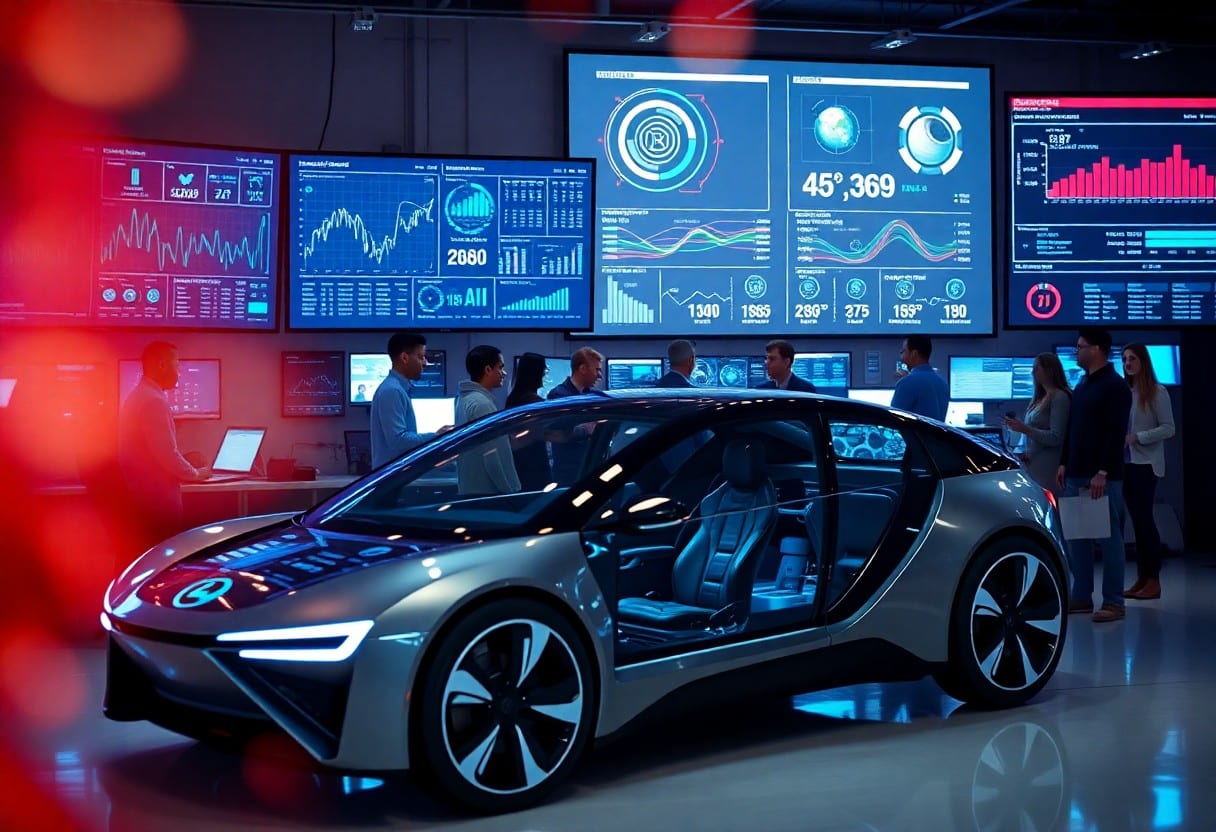It’s clear that understanding automotive AI market size predictions can significantly influence your approach to innovation and personalization in customer experience. As the market evolves, you can leverage insights to enhance product offerings and tailor services to meet your changing needs. By staying informed, you’ll discover how AI is driving the automotive industry’s customer-centric … transformation, ensuring you remain at the forefront of industry advancements.

Key Takeaways:
- Automotive AI market size predictions indicate significant investments, driving advancements in vehicle technology.
- Increased use of AI enhances customer experience through personalized services and tailored features.
- A growing focus on data analytics enables manufacturers to optimize performance and improve safety measures.
The Financial Mechanisms Driving AI Market Growth
Investment in automotive AI is surging, fueled by advancements in technology and increasing consumer expectations for personalization. Financial mechanisms such as venture capital funding, partnerships, and government grants are creating a dynamic landscape for innovation. Major players in the automotive sector are allocating significant budgets to research and development, transforming ideas into real-world applications that enhance vehicle performance and customer interaction.
Investment Trends and Forecasts
Current investment trends indicate a robust growth trajectory for the automotive AI market, projecting a compound annual growth rate (CAGR) of over 35% through 2026. Startups and established companies alike are securing funding rounds in the millions, underscoring the confidence investors have in AI’s ability to revolutionize automotive technology and customer experiences.
Revenue Influences from Consumer Demand
Your demand for personalized and intelligent features in vehicles is significantly influencing revenue streams for automotive AI companies. As consumers increasingly expect seamless interactions and enhanced safety measures, companies are motivated to innovate rapidly, resulting in customized solutions and services that directly address these preferences.
Shifts in consumer behavior are driving the development of advanced AI applications such as predictive maintenance, tailored in-car experiences, and enhanced navigation systems. For instance, automotive brands are using AI to analyze consumer data, allowing them to offer personalized recommendations and features, thus increasing customer satisfaction. A survey indicated that 70% of consumers are willing to pay extra for personalized technology, which not only boosts revenue but also cultivates brand loyalty in a competitive market. As consumers continue to prioritize personalization and smart technology in their vehicles, the revenue potential for AI integrations only expands. This growing demand translates to a substantial market opportunity, motivating ongoing investment and innovation within the sector.
AI Innovation Waves Transforming Automotive Functions
Automotive AI is reshaping several key functions within the industry, creating unprecedented opportunities for innovation and efficiency. From smart navigation systems that adapt to real-time traffic conditions to predictive maintenance algorithms that forecast vehicle issues before they occur, AI technologies are at the forefront of transforming how vehicles operate and interact with their environments. The integration of AI not only enhances driving experiences but also streamlines operations across the automotive value chain.
Shifts in Automation and Safety Technologies
Automation technologies are experiencing rapid advancements, significantly enhancing vehicle safety. AI-driven systems like advanced driver-assistance systems (ADAS) assist with lane-keeping, adaptive cruise control, and collision avoidance. These innovations reduce driving errors, leading to safer roads. As these systems evolve, the implementation of AI technologies aims to increase overall safety metrics in vehicles while laying the groundwork for fully autonomous driving.
Enhancing Manufacturing Efficiency through AI
AI is revolutionizing automotive manufacturing by optimizing production processes. From predictive maintenance in assembly lines to real-time inventory management, AI reduces operational downtime and enhances productivity. Through machine learning algorithms, manufacturers can analyze production data to forecast supply chain needs, ultimately lowering costs and increasing output quality.
Utilizing AI for manufacturing efficiency means leveraging data analytics to predict machinery failures, thus minimizing unexpected outages. For instance, automotive companies like Ford have adopted AI-driven predictive maintenance models that can reduce downtime by up to 30%. Furthermore, AI systems streamline assembly processes through robotics and intelligent automation, increasing productivity while ensuring high-quality outputs at lower operational costs. This shift not only enhances manufacturing capabilities but also strengthens competitiveness in a rapidly evolving market.
Consumers at the Helm: Personalization in the AI Era
Your expectations as a consumer have transformed dramatically in the age of AI. No longer satisfied with generic experiences, you demand personalized interactions that resonate with your specific needs and preferences. This shift is driving automotive companies to leverage AI for tailoring everything from vehicle features to service offerings, enhancing both satisfaction and engagement. With AI’s ability to analyze vast amounts of data, the automotive sector is undergoing a renaissance that puts your desires at the forefront of innovation.
Tailored Experiences Beyond the Purchase
<pPost-purchase, your journey doesn't end; it's just beginning. Automotive brands are recognizing the importance of maintaining a relationship with you that extends beyond the initial sale. By implementing AI-infused platforms, companies provide personalized follow-ups, service reminders, and tailored maintenance plans that enhance your ownership experience. This ongoing engagement builds loyalty and ensures that your individual preferences remain top of mind.
Harnessing Customer Data for Smarter AI Solutions
<pThe automotive industry capitalizes on the vast amounts of customer data generated throughout your interactions. By analyzing your behaviors and preferences, companies can refine their AI solutions, leading to vehicles that better serve your lifestyle. This data-driven approach not only informs product development but also enhances customer support systems, ensuring that you receive timely assistance that aligns with your needs.
<pHarnessing customer data means automotive manufacturers are better equipped to predict trends and develop features that resonate with you. For example, if data shows a preference for eco-friendly driving modes in your region, companies can prioritize these offerings in their models. Sophisticated algorithms can personalize feedback for maintenance and updates based on your driving habits, enhancing convenience and ensuring you're always informed. Ultimately, as your preferences become the focal point of AI development, your driving experience evolves into something uniquely tailored, driving satisfaction to new heights.

Case Studies in Automotive AI Success
Several automotive companies exemplify the successful integration of AI technologies to enhance innovation and customer experience. These case studies highlight how AI has reshaped operations, leading to impressive results in efficiency and satisfaction.
- Tesla: Achieved a 30% reduction in production costs through AI-driven manufacturing processes.
- BMW: Improved customer service response times by 50% using AI chatbots for inquiries.
- Ford: Leveraged AI for predictive maintenance, reducing downtime by 40% in its fleet operations.
- Mercedes-Benz: Enhanced personalization features led to a 20% increase in customer satisfaction ratings.
- Volkswagen: Employed machine learning algorithms that increased sales forecasting accuracy by 25%.
Pioneering Companies Leading the Charge
Industry leaders like Tesla and BMW are pioneering the use of AI to create more efficient production processes and elevate customer engagement. Their innovative applications of machine learning and data analysis have set new benchmarks for automotive manufacturing and service delivery.
The Role of Collaborative Innovation and Partnerships
Collaborative innovation and partnerships are imperative in unlocking the full potential of AI in the automotive sector. By joining forces, companies can share valuable insights, resources, and technologies, fostering a richer ecosystem for AI development.
The synergy created through partnerships accelerates the deployment of AI solutions, enabling you to benefit from a broader range of innovations. For instance, collaborations between tech firms and automotive giants have led to breakthroughs in autonomous driving technologies and advanced safety features. Initiatives like the alliance between Ford and Argo AI exemplify how shared expertise can enhance AI applications, ensuring that both companies remain at the forefront of industry advancements. By pooling knowledge and combining resources, you’ll experience a quicker evolution in AI-driven automotive solutions, ultimately enhancing your experiences as a consumer.
Challenges and Risks in the Evolving AI Landscape
The automotive industry faces numerous challenges as it integrates AI into its operations. Key among these are concerns regarding data security, the reliability of AI algorithms, and increasing competition from tech companies. Manufacturers must navigate the risks associated with dependency on AI while ensuring compliance with emerging regulations. As outlined in AI in the Automotive Industry: Use Cases & Trends, staying ahead of these challenges will be imperative for driving continued innovation.
Ethical Considerations and Consumer Trust
As AI technology permeates the automotive sector, ethical considerations become paramount. You expect transparency in how data is collected and used. Your trust hinges on manufacturers prioritizing ethical AI practices that promote privacy and data security. Companies that fail to address these issues risk alienating consumers.
Regulatory Challenges Affecting Market Dynamics
Regulatory challenges are shaping the dynamics of the automotive AI market. With governments worldwide increasingly scrutinizing AI applications, you face a landscape influenced by evolving compliance requirements. New regulations related to data privacy, safety standards, and liability for autonomous vehicles alter the competitive landscape, as manufacturers balance innovation with adherence to these laws.
For instance, the European Union’s General Data Protection Regulation (GDPR) sets strict guidelines on data usage, directly impacting how automotive companies utilize AI-driven personalization. In the U.S., different states are proposing varying laws around autonomous vehicle operation, creating a patchwork of compliance scenarios. These regulatory landscapes not only affect operational costs but also influence market entry strategies, forcing companies to adapt quickly to maintain their competitive edge. As a consumer, these regulatory changes can ultimately shape the safety and functionality of the vehicles you use.
To wrap up
Hence, as you explore the automotive AI market size predictions, you can recognize how these insights are steering innovation and enhancing your customer experience. By leveraging advanced AI technologies, you can personalize offerings that meet the evolving demands of consumers. Stay informed by reviewing resources like AI in the Automotive Industry: Market Overview, which can provide deeper understanding and strategies for embracing this transformative landscape.



